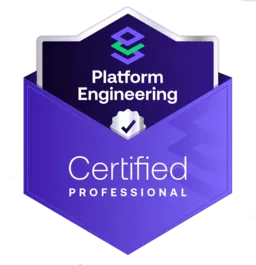· Pavel Tuma · Platform Engineering · 2 min read
What Platform Engineering is and is not
Kubernetes cluster, Backstage portal, fine-tuned CI/CD pipeline, bunch of new tools - that's the common perception of platform engineering. But that's nowhere near the truth.

Platform Engineering Community
Last year we stumbled upon something exciting: the platform engineering community at platformengineering.org was starting to shape its own official courses and certifications. Back then, it was only the early days, with a Fundamentals course and a follow-up on MVP-to-Production readiness. Fast forward to today, the journey has come full circle—those first experiments have matured into well-structured programs with new names that align perfectly with the certification path. Having been through a few internal developer platform (IDP) initiatives myself, often without much theoretical guidance, I saw this as the right moment to balance my hands-on lessons with the collective wisdom distilled in these courses.
Typical Approach to Platform Engineering
It is common to see organizations carve out a group of developers, give them the title “Platform team”, and then set up a separate “DevOps team”. The platform team typically focuses on the developer-facing things like Developer experience, scaffolding etc. while the DevOps team gravitates toward infrastructure and operations. It usually starts something like this:

Backstage portal is installed. The platform team begins crafting boilerplates for applications, pipelines, and more. Meanwhile, the DevOps team continues providing infrastructure in an old-fashioned TicketOps style. Together, they introduce a collection of tools and technologies—often chosen in isolation, without much input from the rest of the engineering teams. At that point, the effort is often declared finished: platform engineering is “done,” and the internal developer platform (IDP) is considered functional.
Platform Engineering is Cultural Change
If you expect the courses at Platform Engineering University to dive deep into tools and technologies, you might be surprised. Out of nearly two dozen modules, only two are dedicated to that. And that’s intentional.
Because platform engineering is not about technology first. The core is organizational and cultural change. Tools are not the bottleneck. The real challenges are reshaping processes, changing established habits, and convincing people to work differently. Simply gathering a few developers, calling them a platform team, and giving them the mandate is not enough. That’s why platform engineering is such a demanding discipline that requires skills far beyond software development or infrastructure. And it’s also why so many platform initiatives ultimately fail.
We partially verified this during our own platform projects, where we managed to avoid some dead ends but not others. Now as a fresh Platform Engineering Certified Professional, I can see it way more clearly.
